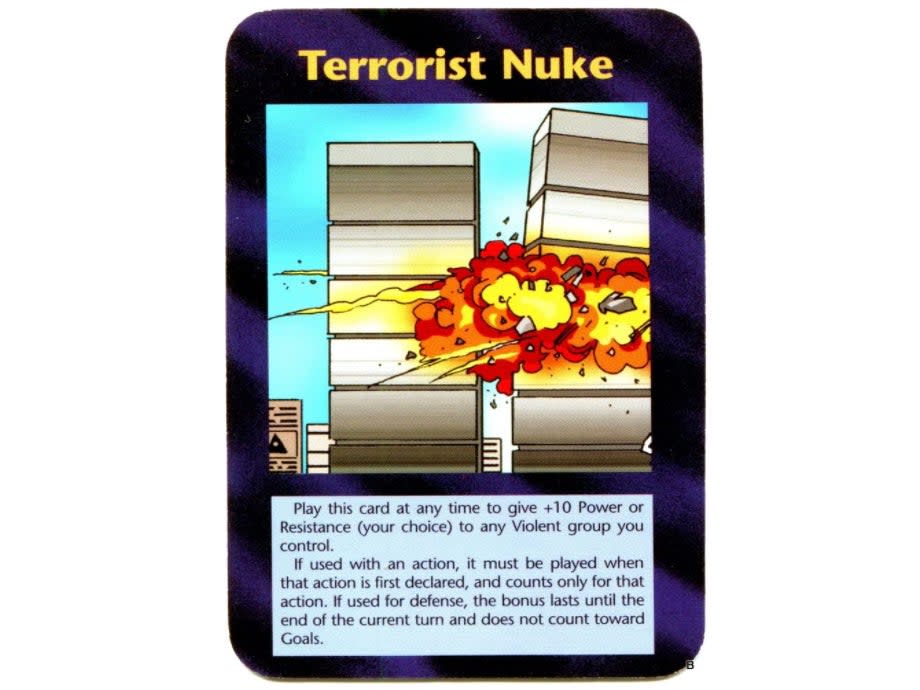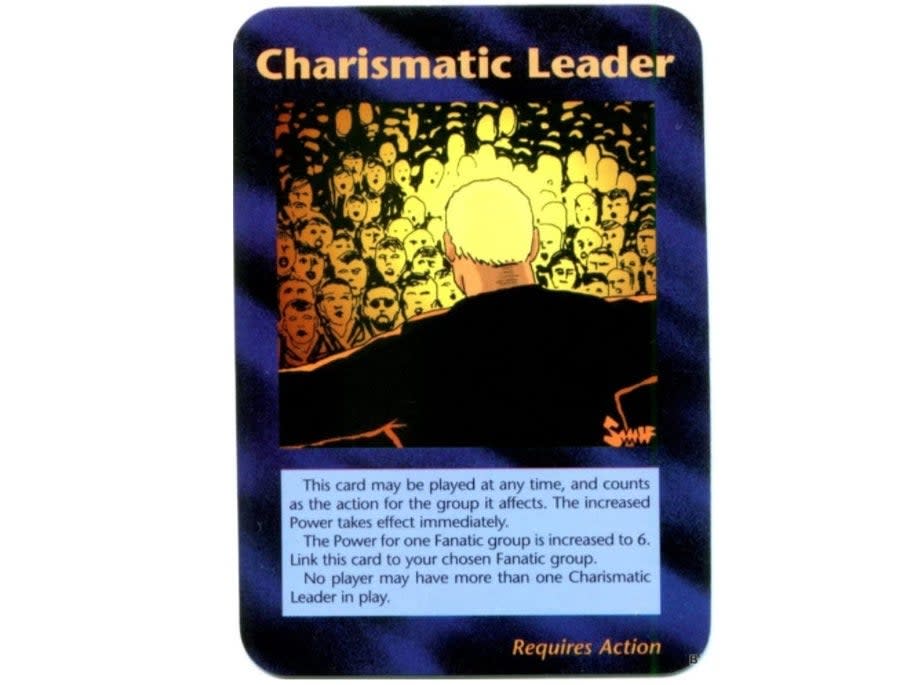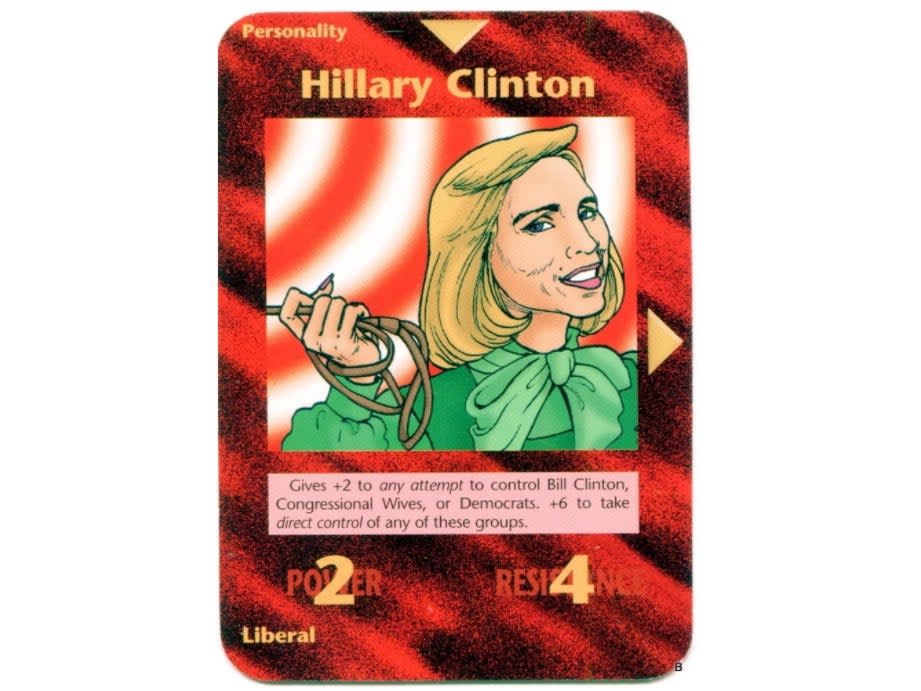The 1990s card game that ‘predicted’ 9/11, Donald Trump, Covid and the Capitol riot

- Oops!Something went wrong.Please try again later.
An out-of-print multiplayer card game that first appeared in 1994 is continuing to attract interest and unease online over its apparently eerie ability to “predict” major global events, from 9/11 to the election of Donald Trump, the coronavirus pandemic and the riot at the US Capitol on 6 January this year.
Illuminati: New World Order was released by Steve Jackson Games and cast the player as a puppet-master pursuing world domination on behalf of their chosen mythic secret society, the game offering a choice of the Bavarian Illuminati, the Discordian Society, the UFOs, the Servants of Cthulhu, the Bermuda Triangle and the Gnomes of Zurich.
The goal of Illuminati - spun off from the same company’s 1982 board game that was in turn inspired by The Illuminatis! Trilogy (1975) fantasy novels by Robert Shea and Robert Anton Wilson - is to develop and consolidate a power structure through which to rule the globe from the shadows on behalf of your chosen order, manipulating society and dealing out apocalyptic blows to your opponents as you go.
“Maybe the Illuminati are behind this game,” Mr Shea wrote in his introduction to the original game’s rulebook. “They must be - they are, by definition, behind everything.”
While the game’s preoccupation with globalist deep state conspiracy themes was clearly wildly ahead of its time, anticipating our bamboozled, boggle-brained era of fictional election-rigging claims, QAnon, anti-vaxxers, 5G paranoia and seething app-based nonsense cauldrons like Telegram, it’s the 2,000AD, Tarot-style illustrations on the cards themselves that are the real source of fascination.
Illuminati’s “Terrorist Nuke” card, for instance, shows an explosion midway up a skyscraper in a scene that looks undeniably like the attack on the Twin Towers of the World Trade Center in New York City on 11 September 2001.
One depicts a bomb blast at the Pentagon, the next shows barbed-wire fencing around the White House shielding the president from civil unrest, a scene realised last summer during the Black Lives Matter demonstrations in Lafayette Square.
Speaking of Mr Trump, there’s even a “Charismatic Leader” card that features a blonde-haired demagogue addressing a crowd of adoring supporters in a seemingly uncanny forecast of the reality TV businessman’s rise to power, amusing given that he was a bankrupt Atlantic City casino impresario at the time of the game’s launch with very little prospect of being taken seriously ever again.

There’s a Hillary Clinton card in the deck and a tree-hugging Al Gore (they were US first lady and vice president at the time), Iraqi dictator Saddam Hussein makes an appearance and there is a particularly gruesome card anticipating the advent of militant political correctness, now a regular bugbear of Fox News, which portrays two hanged men holding signs announcing their crimes.
“Used Insensitive Pronoun,” reads one.
“Ate Flesh of Dead Animals,” says the other.
There’s a “March on Washington” card, one for “Market Manipulation” instigating a deliberate Wall Street crash, and even a “Plague of Demons” descending on DC to set Q hearts racing.
Illuminati has long-since been discontinued and become a collector’s item, with unsealed decks sold on Amazon and eBay for almost $2,000, the wildly inflated price an indicator of high demand among a certain sort of feverish-minded consumer.
In addition to the game’s artwork, a further source of intrigue is the fact that the Secret Service raided the offices of Steve Jackson Games in Austin, Texas, on 1 March 1990 and confiscated hard drives and documents, some of which pertained to the board game.
While conspiracy theorists believe this represented the feds moving in to hastily hush up Illuminati and stop the developers revealing the existence of its secret societies to the wider world (why would you choose to make that information public in board game form, rather than, say, by hosting a press conference?), this is simply untrue.
One of the company’s employees, Loyd Blankenship, was also a hacker who served as the system operator for a messaging board that had published a stolen set of files detailed how America’s 911 emergency response systems worked, a fact the Secret Service had been tipped off to and been a granted a search warrant to investigate.

Speaking to Vice News about his old boss in 2012, Mr Blankenship said: “Steve is a huge fan of conspiracy theories. Not that he believes in them - as far as I could tell in five years of working with him - rather, he is immensely entertained by them.”
The site also spoke to illustrator John Grigni about the “prophetic” imagery he drew for the series.
Mr Grigni admitted the coincidences but said that the likes of the “Terrorist Nuke” card were inspired by anxiety about the threat potentially still posed by post-Soviet Russia rather than any vision of what was to come from al-Qaeda.
“Terrorism was heating up as a ‘headline seller’ without the ever-present threat of nuclear annihilation, but we were still looking at Hamas and Palestine as likely culprits for such acts,” Mr Grigni explained.
“Art direction-wise, frankly a nuke wouldn’t just blow up one building, even a ‘tactical’ nuke would do damage on a much larger scale. It does seem oddly prescient, given the ‘Twin Towers’ shown.”
Steve Jackson himself has also addressed the game’s origins, telling Dragon Magazine in the mid-1980s that his intention was primarily satirical and that he hoped to keep the tone “tongue-in-cheek rather than serious”.
He explained that the original concept arose from a conversation with cover artist Dave Martin in September 1981 about their mutual administration for the Shea and Wilson novels.

“Even aside from the question of buying game rights to a novel (always an involved and expensive process), there was the subject matter,” Mr Jackson recalled.
“Giant golden dope-smuggling submarines, talking dolphins, anarchistic midgets, the holy man underneath Dealy Plaza (the Dealy Lama, of course), dozens of secret organisations with obscene acronyms, and a final deus ex machina in the form of a real live (and horny) goddess… Even if you could figure out who was on whose side, which I didn’t think I could, how could you make a game out of it? But it was such a fascinating thought!”
Mr Jackson explained that he had carried out extensive research into cults and conspiracy theories and observed: “It’s possible to get deadly serious about the idea of conspiracies and assassinations. I didn’t want that. Among all the material I’d read, the articles with the really wacky theories - even if they were presented totally seriously - were the most fun to read. Logically, then, a wacky game should be more fun to play.
“As much as possible, I wanted to retain the ‘flavour’ of the conspiracy material I’d been reading. That’s why groups like the South American Nazis, the Cattle Mutilators, the fluoridators, the Communists, the oil companies and the United Nations, are in there.”
Perhaps the clearest insight into Illuminati’s alleged soothsaying properties comes from Mr Blankenship, who told Vice: “It’s pretty much like any psychic - say that a Middle Eastern leader will be killed next year and you have a decent chance of getting it right.”
Read More
AI reveals how Bill Gates Covid conspiracy and other theories evolved online
China and Russia played significant role in promoting QAnon conspiracy theory, study claims

